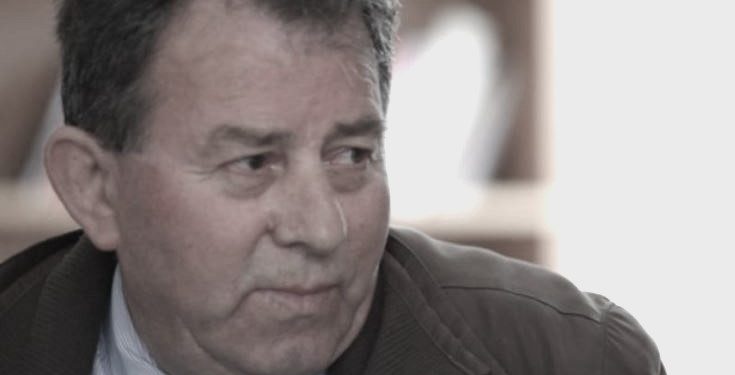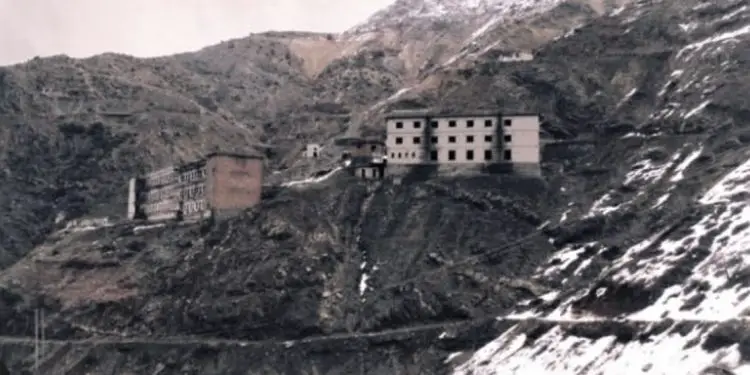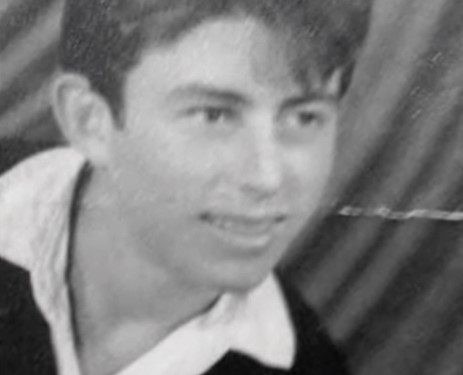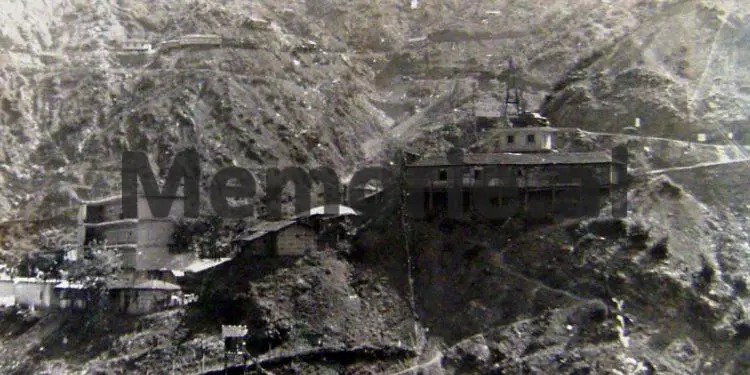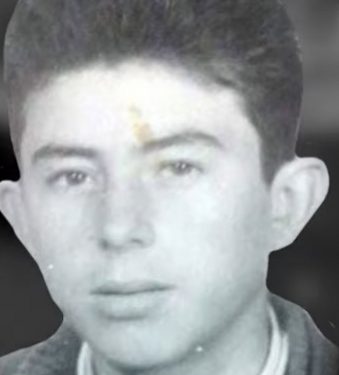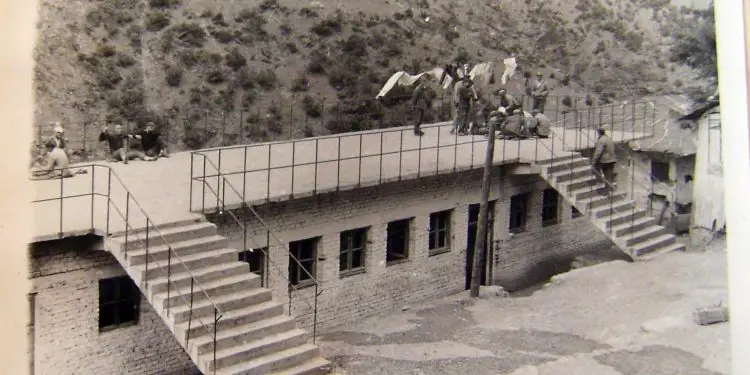By Shkëlqim Abazi
Parte seconda
Memorie.al / I were born on 23.12.1951, in a black month of a time of mourning, under the blackest communist regime. On September 23, 1968, the sadistic chief investigator, Llambi Gegeni, the brutish investigator Shyqyri Çoku, and the cruel prosecutor, Thoma Tutulani, mutilated me at the Branch of Internal Affairs in Shkodër; they split my head, blinded one of my eyes, deafened one of my ears, after they broke several of my ribs, half of my molars, and the thumb of my left hand. On October 23, 1968, they took me to court, where the pathetic Faik Minarolli gave me a ten-year political prison sentence. After my sentence was halved because I was still a minor, a sixteen-year-old, on November 23, 1968, they took me to the Reps political camp, and from there, on September 23, 1970, to the Spaç camp, where on May 23, 1973, in the Revolt of the political prisoners, four martyrs were executed by firing squad: Pal Zefi, Skënder Daja, Hajri Pashaj, and Dervish Bejko.
On June 23, 2013, the Democratic Party lost the elections, a perfectly normal process in the democracy we claim to have. But on October 23, 2013, the Director General of the “Renaissance” government sent order No. 2203, dated 23.10.2013, for the termination of a police employee’s duty. Thus, Divine Providence became entangled with the neo-communist “Renaissance” Providence, and precisely on the 23rd, they replaced me, with nothing less than the former operative of the Burrel Prison State Security. What could be more telling than that?! The former political prisoner is replaced by the former persecutor!
The Author
SHKËLQIM ABAZI
REPSI
(The Forced Labor Camp)
Memoir
The Reps prison camp was established on the right side of the Fan Valley, on a not-too-steep hillside.
Over a multi-millennial journey, the Fan River had divided that mound into two nearly equal parts, creating a gigantic riverbed for the small amount of water it carried towards the Mat River. In this segment, it ran parallel to two side paths, and then as far as the eye could see, it disappeared after a sharp bend. Right after that turn was the bridge that connected the two parallel paths, one that snaked up to Spaç and climbed into the depths of Orosh, and the other one below it.
The entire hill on the eastern face was enclosed with barbed wire fences, about three meters high, with a double perimeter. Every fifty meters, a guard post was erected, where soldiers armed with automatic rifles stood watch, and on each, a light machine gun was installed.
At the foot of the hill, by the river’s gravelly bed, a few meters below the perimeter, the path to the deep areas turned yellow. This road was full of potholes and was not well-maintained. During the rainy season, the swollen streams descending from the surrounding hills would turn it into a muddy mess and had transformed the entire segment into a “path of torment.” Among the sticky, annoying mud, the wheels of cars would get stuck, a curse for the drivers and the troubled villagers of these areas.
There, the winter was bitter. The relentless and cold wind created terrifying whirlpools that even managed to change the direction of raindrops. When you realized that the rain was falling backward, from the ground towards the sky, due to the incline given by the dizzying north wind, you’d think you were entering another orbit, where other laws of gravity operated.
Before touching the ground, the liquid particles would change direction and turn into needles of sleet that would pierce your flesh. On the sloping terrain, frost formed a shiny film of ice, so when you stepped on it, you felt like you were sliding on a skating rink.
Many prisoners paid dearly on those slopes; they were badly mutilated, especially the elderly, who could barely stand. The opposite happened in the summer; the prolonged drought was accompanied by high temperatures and turned into a nightmare. An inseparable haze of yellow smoke hung in the air.
Pushed by directionless currents, this dusty mass would turn into a dense veil of cloud that tired your eyes and gave the entire landscape a disgusting ocher color, so much so that you couldn’t distinguish other colors. When you happened to pass through there and saw yourself covered by this yellowish veil, you felt like you were walking among the dunes of the Sahara. The camp huddled beneath this veil of paleness, like a corpse under a shroud.
The atmosphere was saturated with unhealthy, perpetually dirty, and filthy air, and if you add to this the insufficient amount of drinking water, what little came had a bitter taste. The environment turned into a slaughterhouse, and the camp itself, into an unsuitable place for a normal life. These factors negatively affected the health of the overwhelming majority of prisoners, who suffered from ulcers, respiratory diseases, and especially tuberculosis.
From the very first day, as soon as I arrived there, I was confronted with the worst, with the Mirdita whipping bitterness. It was the beginning of the winter of 1968, precisely November 24. After they crammed us into the prison-van, two by two, tied with German cuffs (they had given this affectionate name to the handcuffs), they sent us from the cells of Shkodra to an unknown destination.
After endless hours of rattling and shaking inside the moving tin shack, where air entered through a narrow embrasure of thick iron bars that also served for light, the prison-van stopped somewhere. We didn’t know where. They threw what looked like a sack with a human body inside, and the tin rattle set off again.
Where to? The devil knew! It stopped again somewhere, then somewhere else, and then finally… Where? As we understood from the conversation between the escorting police and some other northerners, we must have ended up in the Reps camp. All our guesses had been in vain. When they opened the iron door of the wreck that brought us there, we found ourselves cooped up in a kind of sheepfold, with a triple perimeter.
The police who had escorted us from Shkodra urged us to get down. The strangers who greeted us howled and shouted. Dazed by the howling and the bright lights, we couldn’t get our bearings. We were completely stunned; the mishmash of orders, which no one could make sense of, shocked us. The escorts ordered: “Quick, fellas, jump down, night is upon us!” The greeters would answer: “Take it easy, you guys!”
Amidst the chaos, sticks began to whistle; one would throw, the other would dodge, you didn’t know where to protect yourself first. I also took some good hits. Finally, the escorting police, annoyed by our clumsiness, climbed on top and, by our arms and legs, threw us from the body of the truck, tossed the few rags we had with us over our heads, and then took off our German cuffs, which they plunged into a small chest.
We found ourselves among the wires, surrounded by the camp police, under the savage gazes of a snarling dog. Those who had brought us quickly closed the handover protocol, got into the prison-van, and greeted us in the most ominous way: “Worse and worse! May you never lift your head again and may you leave your bones and skin here!”
Oh God! I had not heard a more shocking curse until then. Now without the irons on our hands, we were dragging our limbs, numb from the cold, but more from the pain caused by staying crouched for a long time. We were left in the middle of the barbed wires, squeezed like sandwiches. Just when we thought we had escaped the torment, a harsh voice, with a metallic sound, buzzed in my ear: “To the roll call! To the roll call!”
This scream caught me off guard. My whole body shuddered; I felt the remaining hairs on my shaved head turn into hedgehog spines. An icy shiver ran down my spine. At that moment, I thought a powerful megaphone had boomed next to my ear; but later, when I would learn that, although such a device really existed, it wasn’t the one that had made me tremble, but the camp’s crier, with his bomb-like tone.
The timbre of that prolonged voice would not leave me for a full five years. Later, it would follow me for the rest of my life, in frightening dreams with prisons, police, and criers. When you saw that tiny, weak, anemic, and yellowish man, that little guy a meter and a half tall, you couldn’t believe that such a hoarse, sharp, and powerful sound could come out of the throat of that little thing. Even today, after more than forty years, the Kosovar from Fier, named Ismail (Little Malua), appears to me with his booming voice.
They pushed us to the entrance of the inner gate, into a type of small shack, about two square meters, which the police called an office, but which resembled anything but an office. There, under the watch of a policeman and two soldier guards, armed with automatic rifles, who were observing from a little further away, they left us waiting. About ten meters further, in the guard post that stood above the camp’s main gate, another soldier was threatening us with a light machine gun pointed at our heads. No one spoke. In silence, each of us mourned his own fate, thinking about the misery that this gate, with its triple-barbed fence, had in store for us. Would we, after all, manage to get out of this door alive?
Only God knew! We remained trapped for a few more minutes, which felt like a century to me, then two policemen and an officer suddenly rushed in; it seemed to be the officer on duty. “All your clothes on the ground!” one of them ordered. Initially, I was confused. I didn’t understand what clothes he was talking about, because the bundles were lying on the floor. But the policeman motioned for the clothes on our bodies. I saw the others take them off, and I stripped too.
Naked like that, they searched us strictly, as if we hadn’t come from cells where their colleagues had already searched and re-searched us several times. Then, on a large notepad, the size of a tabletop, they registered our personal details. When they finished this formality, they turned and asked us one by one if we had ever been convicted before.
“Who is in prison for a second time?”
No one answered.
“You?”
“No!”
“What about you, have you been here before?”
“No!”
“And you, and you, and you?” When they were sure that none of us had previous experience, they raised their voices and threatened us with isolation in the camp cells. “If you violate the internal regulations or if you are caught associating with the old prisoners (who, according to them, were dangerous, incorrigible enemies and with their unworthy behavior, could become an obstacle to our speedy rehabilitation), you will pay dearly!
“Did you get that, you guys?”
“We got it!”
“What about you?” a short, blond-haired man turned to me and grabbed me by the neck.
“I believe so!” I stammered!
“Now, move your ass!”
This was, in a nutshell, the subtext of what they conveyed to us. The wretches forgot that we too were political prisoners, just like those who had vegetated for years behind these barbed wires, just as they would force us to get through long, long years. Anyway, that’s another story…! That day they did their duty, for which they were paid. That is, to insult us, to frighten us, to threaten us, to intimidate us, in the hope that they might succeed in breaking someone, right from the first moment of entering the state-run HELL.
Night fell. A black shroud unfolded across the hills of Reps. What an abstract painting! The brown veil melted the outlines of the houses’ roofs, illuminated by a few weak lights scattered here and there, among the crooked branches of some skeletal trees. A piercing cold wind began to howl, which, meanwhile, the Fan gorge multiplied and turned into a sharp roar. Shivers went all the way to my heart.
Cold. Frost. Terror. Just as my body trembled, I asked myself: “Why is this place called Reps? What a devil of a name is this? Soak! To skin…! The butcher skins the goat, the ram, the lamb, the kid, the calf”?!
“We skin human hides, you fool!” a dull sound buzzed in my ear.
“No, man!”
“Yes, man!”
“Man, who are you?!”
“We are the Marxist-Leninist butchers of the Western Balkans!”
“And you skin hides?!”
“Yes, you fool! They skin hides everywhere!”
“I didn’t know that!”
“Man, haven’t you heard that February shortens the days, March skins the hides!”
“Of course. But whose?”
“Yours, you fool!”
“How, man, how?”
“The enemies’!” This imaginary dialogue had unraveled in my brain, so I froze in place. I opened my eyes wide. Had I spoken aloud? But no, they continued to talk, and we listened. I must have been talking to my alter-ego! Lost in these thoughts, I had come to an interesting conclusion, and of course, I didn’t claim to be the first to think of it: “Reps? It must be a synonym for the verb soak (to skin), but others must have reached this conclusion long ago, because they may have paid more dearly for it, maybe even with the price of their lives!”
I wiped the daydreams from my mind and returned to reality. Meanwhile, I saw the police bristling like wolves before the flock. I smelled the wind, like the roar of the mouth of HELL! “Oh God! What cruel people, what a savage nature, what a chilling cold! Anyway, let’s leave people to their own devices; they’ll scream, and we’ll bow our heads! But the place, man, the place, what can we do about it? It will eat us alive, it will take our name! Oh God!” I remembered the proverb; “don’t be afraid of a bad person, be afraid of a bad place”: “Fine, we’re enduring the people, but where will we go?!”
Who would let us escape from there?! They had surrounded us with barbed wires, armed soldiers, and border dogs! They had marked us for sacrifice, for a modern-day offering; they wanted to bury us like Prometheus, behind the communist rock! Perhaps, we would have to endure the “eagle” Enver, who with his bloody claws would tear at our livers, little by little, day after day, year after year, decade after decade, inside the socialist “paradise,” surrounded by barbed fences!
At that moment, I felt alone, facing the pack of state leeches, drained, weightless, buried beneath the roaring abyss; with hope, I turned to the Great God: “Oh God, save us from this HELL where we have been violently locked up!” At that minute, I surrendered to Him, just as a boatman with a broken oar surrenders to the raging waves.
For the first time, I saw the faces of prisoners up close. From the narrow window of that so-called office, I made out some pale, stooped, and thin silhouettes, stretching out their shaved heads, with white hats. They looked similar in complexion. Yellowish. Pale. Unwashed. Unshaven. Dressed in one color; all brown. After the physical check and the lecture on how to behave inside the camp, they took us out of the office. Some grumpy men with mustaches twisted from ear to ear came before me. When they stood in front of me and looked at me, as if they were going to swallow me alive, I thought the old “komitas” from the time of the Turks had been resurrected.
As soon as I took my first step, I almost ran into a man with a mustache. Those yellow mustaches, twisted towards his ears like a ram’s horns, terrified me. Instinctively, I dropped my bundle of rags on the ground and raised my hands in a defensive position. I waited to see how the situation would unfold. But strangely, the owner of those terrifying mustaches formed a very friendly smile, which contrasted with his grim face. The yellow mustaches began to twitch with an invisible joy, as if they were welcoming me.
All my attention was focused on those mustaches, so I didn’t expect a single kind word to come from the lips beneath them, much less the ones I heard a little later: “Welcome, men, may God make it easy for you, and may you pass through and leave in good health!” The owner of the terrifying mustaches immediately folded in half over my rags, threw them on his back, and went up the stairs.
A few others did the same, snatching the bundles of my fellow travelers. I separated from my friends and clung to the yellow-mustached man, because I didn’t want to lose sight of him. He had “stolen” the only possessions I had at that moment. For months in the cells of Shkodra, I had experienced what it meant to sleep directly on the cement of the cells, with two ragged blankets that you could see through even at night.
Since I didn’t want to lose them, I clung to the yellow-mustached man whose name I didn’t even know. At the top of the steep stairs was a flat terrace, not very wide. At its edge, a long shed, covered with sawdust, was erected. My “robber” entered its door. I ran after him. He stopped in the middle of the corridor, said something to another person, and then threw the bundle onto a plank bed, in an empty space. He turned to me and, with a finger pointed at two elderly men, invited me to come closer.
“Come on! These two old men will be your bed mates!” still with his hand outstretched, he showed me the place where my unpacked bundle lay. Two old men, very different from each other, were looking at me from above their beds with a kind of pity. At least that’s how it seemed to me, perhaps influenced by the effect of the long time in isolation, where I only saw police, investigators, and cell mates.
At that time, I had no idea what “bed mate” meant. Of course, later I would learn that this was the name for the person with whom you shared the seventy-centimeter border. That was the bed’s standard size, where the mattress, which I heard they called a “bed,” was laid out.
“This is where you’ll spread your bed, but first, get to know these old men!” the mustache continued. “This one here is Uncle Esheref from Dibra, a professor and more than a professor, and this other one is Father Vaska, from Korça. Now I’m leaving, good night and goodbye!” The mustached man turned his back on us, without even waiting for a thank you. Memorie.al




